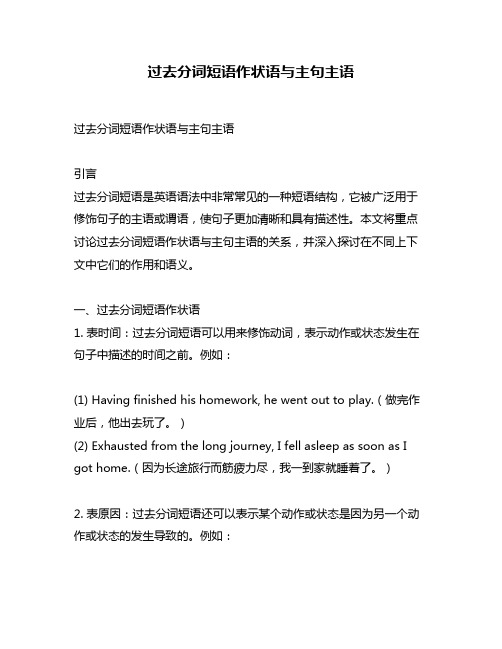过去分词作状语
过去分词作状语详解

过去分词作状语详解一.过去分词作状语的基本用法:过去分词作状语主要是说明谓语动作发生的背景或条件;表示原因、时间、条件、让步、方式或伴随情况等。
过去分词可置于主句前,也可置于主句后,用逗号与主句隔开。
例如:1. 原因状语Choked by the heavy smoke, he could hardly breathe. 他被浓烟呛了,几乎不能呼吸了。
Caught in a heavy rain, he was all wet. 因为淋了一场大雨,所以他全身湿透了。
Frightened by the noise in the night, the girl didn’t dare to sleep in her room. 受到夜晚响声的惊吓,那姑娘不敢睡在她的房间。
2. 时间状语Left to itself in the room, the baby began to cry.当被孤独地留在房间里时,婴儿哭了起来。
Asked why he did it, the monitor said it was his duty. 当被问及这件事时,班长说这是他的职责。
Approached in the dark, the lights looked lonely and purposeless. 在黑暗中走近时。
那些电灯显得孤单而无意义。
3. 条件状语Seen in this aspect, the matter isn’t as serious as people generally suppose.如果从这个角度看,问题并不像人们一般预料的那样`严重。
Grown in rich soil, these seeds can grow fast. 如果种在肥沃的土壤里,这些种子能长得很快。
Given better attention, the accident could have been avoided. 要是多加注意,那次事故就能避免了。
过去分词做状语

某些过去分词(短语)来源于系表结构,有些甚至具有形 容词的特征,因此,虽然它们作状语时与句子主语之间存 在逻辑意义上的主动关系,但仍然用它们的过去分词来作 状语。这类过去分词(短语)常见的主要有:caught in,
devoted to, disappointed at, determined to, dressed in, exhausted,hidden, lost in, prepared for, seated, tired of 等。 Caught in the heavy rain, Jennifer didn’t arrive on time. Disappointed at the examination results, the top student sat there in stony silence. Entirely devoted to the Party, the young soldier gave his life for his country.
√
looking "We can't go out in this weather," said Bob, ________
(look) out of the window. 过去分词与句子主语构成动宾关系(被动), 而现在分词 与句子主语构成主谓关系(主动)。
现在分词的时态和语态
主动形式 一 般 式 完 成 式 (not) doing 被动形式 (not) being done
(not) having been (not) having done done
1. Not knowing his address, I could do nothing but stay at home and wait. 2. Not having received his father’s letter, he decided to make a call to him. 3. Having been translated into many different languages, this book become well known all over the world.
过去分词短语作状语与主句主语

过去分词短语作状语与主句主语过去分词短语作状语与主句主语引言过去分词短语是英语语法中非常常见的一种短语结构,它被广泛用于修饰句子的主语或谓语,使句子更加清晰和具有描述性。
本文将重点讨论过去分词短语作状语与主句主语的关系,并深入探讨在不同上下文中它们的作用和语义。
一、过去分词短语作状语1. 表时间:过去分词短语可以用来修饰动词,表示动作或状态发生在句子中描述的时间之前。
例如:(1) Having finished his homework, he went out to play.(做完作业后,他出去玩了。
)(2) Exhausted from the long journey, I fell asleep as soon as I got home.(因为长途旅行而筋疲力尽,我一到家就睡着了。
)2. 表原因:过去分词短语还可以表示某个动作或状态是因为另一个动作或状态的发生导致的。
例如:(1) She missed the bus, being late for work.(她错过了公交车,因为迟到上班。
)(2) The team lost the match, having made too many mistakes.(由于犯了太多错误,队伍输掉了比赛。
)3. 表方式:过去分词短语可以描述动作的方式或方式。
例如:(1) He drove the car, carefully avoiding any obstacles.(他小心地开车,避开了任何障碍。
)(2) She completed the project, skillfully using her knowledge.(她运用自己的知识,熟练地完成了项目。
)二、过去分词短语作主句主语过去分词短语还可以作为主句的主语,这时它在句子中扮演的角色更加突出,通常表示被动或完成的动作。
1. 表示被动:过去分词短语作为主句主语时,通常表示主语所受到的动作或影响。
过去分词作状语的用法归纳

过去分词作状语的用法归纳
1. 哎呀,当过去分词表示被动或完成的时候,就可以作状语啦!就像“He was deeply moved by the story.”这里的“moved”就是被故事深深打动呀。
2. 嘿,要是过去分词用来表达原因,那也是很妙的哟!比如说“Frustrated by the failure, he almost gave up.”这“Frustrated”不就是因为失败而沮丧嘛。
3. 哇塞,当过去分词表示时间,这多神奇呀!像“Seen from the top of the mountain, the view is amazing.”看到没,“Seen”就是从山顶被看到那个时间点呀。
4. 哟呵,过去分词表示条件的时候,是不是很有意思呀!例如“If prepared well, you will do great.”这里的“prepared”就是如果准备好这个条件呀。
5. 哈哈,过去分词还能表示让步呢!像“Though beaten many times, he still doesn't give up.”“beaten”就是尽管被打击很多次啦。
6. 哎呀呀,当表示方式或伴随的时候,过去分词也能上呀!比如“She sat there, lost in thought.”“lost”不就是那种伴随的状态嘛。
7. 嘿呀嘿呀,过去分词作状语的时候,可真是变化多端呢!就像“Surrounded by his friends, he feels happy.”“Surrounded”就是周围被朋友围着呀。
8. 哇哦,过去分词这么有用,大家可得好好掌握呀!
总之,过去分词作状语的用法很多,大家要多多练习,才能运用自如呀!。
过去分词作状语

动词-ing或过去分词作状语, 其逻辑 主语应是主句主语。
2. If ___ the same treatment again, he’s sure to get well. A. giving B. give C. given D. being given
3. _____ in 1636, Harvard is one of the
A. followed C. to be followed
B. following D. being followed
3. The next morning she found the man _A__ in bed, dead.
A. lying C. lay
B. lie D. laying
4. I can hardly imagine Peter _B__ across the Atlantic Ocean in five days.
A. are bought B. bought C. been bought D. buying
( D)14. Don’t use words, expressions, or phrases ________ only to people with specific knowledge. A. being known B. having been known C. to be known D. known
高考链接
(A)1. _______ more attention, the tree
could have grown better.
A. Given B. To give
C. Giving D. Having given.
(D)2. The computer center, ________ last
过去分词作状语的用法

过去分词作状语(The Past Participle used as Adverbial) 一、过去分词作状语的一般用法1. 过去分词作状语,可以表示时间,原因,条件,让步及伴随情况等。
过去分词作状语,可以表示时间,原因,条件,让步及伴随情况等。
过去分词作状语,其逻辑主语必须和句子主语保持一致,并且必须是被动关系。
过去分词作状语,其逻辑主语必须和句子主语保持一致,并且必须是被动关系。
Asked how he broke into the room, he made no answer. (当有人问他怎么闯进屋里来,他一声不吭。
)_________________________________ When heated ,water will be turned into steam. 水加热后会变成蒸汽。
(表示时间)(表示时间) ___________________________________ Deeply moved by the film , we all cried. 由于被电影深深打动,我们都哭了。
(表示原因)___________________________________ Born into a poor family , he had no more than two years of schooling. 出生于贫苦家庭,他只上了两年学。
___________________________________ Given more help, we could have done the work better. 如果给我们的帮助多一些,我们本来能做的更好。
(条件)___________________________________ Though frightened by the big fire , he stood out bravely. 尽管害怕大火,可他还是勇敢地站了起来。
过去分词做状语和定语时的区别
过去分词做状语和定语时的区别一、过去分词(短语)做状语1、与句子主语的关系当过去分词(短语)做状语时,要与句子的主语有关系,而且一般是被动关系。
在读下面所有的例句时,请注意过去分词短语与句子主语的关系。
先分析例句:Frightened by Santa Claus …words,Scrooge woke up.句子的主语是Scrooge,状语部分为Frightened by Santa Claus‟words,可以看出Scrooge是“被”Santa Claus的话“惊吓”(Frightened)。
2、在句子中的位置过去分词做状语,修饰的是句子中的位于,多放在句首,也可以放在后面,后者插在句子的中间。
Seen from the hill,the city looks magnificent.从山上看这座城市非常壮观。
They came in,followed by their wives.他们进来了,妻子们跟随在后。
Tom,horrified at what he had done,could at first say nothing.Tom对他做的事感到恐惧,一时说不出话来。
3、所表示的状语种类过去分词做状语可以表示伴随情况(即主句的谓语动作与状语同时发生)、表示原因、表示条件、也可以表示时间。
He entered,accompanied by his secretary.(伴随情况)他由秘书陪着走了进来。
Moved by his speech,many people volunteered to help in the work.(原因)由于受他讲话的感动,许多人自愿参加这项活动。
Taken in time,the medicine will be quite effective.(条件)如果及时服用,这种药是相当有效的。
Heated,water changes into steam.(时间)当被加热的时候,水可以变成蒸汽。
语法专题:过去分词作状语
过去分词作状语一、过去分词(短语)作状语过去分词作状语,修饰谓语动词,进一步说明谓语动词的动作和状态,即动作发生时的背景或状况,其逻辑主语则为句子的主语,其主语为过去分词动作的承受者。
过去分词作状语时,可单独使用,也可以在其前面加上适当的连词,可表示时间、原因、条件、伴随、方式等。
1.作时间状语过去分词(短语)作时间状语时,可转换为when,while或after等引导的时间状语从句,有时也可以直接在过去分词前加相应的连词。
Seen from the top of the hill,the park looks more beautiful.=When (it is) seen from the top of the hill,the park looks more beautiful.从山顶往下看,这座公园看起来更加漂亮。
2.作条件状语过去分词(短语)作条件状语时,可转换为if,once或unless等引导的条件状语从句,有时也可以直接在过去分词前加相应的连词。
Given more time,we could do it much better.=If we were given more time,we could do it much better.多给我们点时间,我们会做得更好。
3.作原因状语过去分词(短语)作原因状语时,可转换为as,since或because引导的原因状语从句,这类状语多放在句子前半部分。
Encouraged by the progress he has made,he works harder.=As he is encouraged by the progress he has made,he works harder.由于受到所取得的成绩的鼓舞,他工作更努力了。
4.作让步状语过去分词(短语)作让步状语时,可转换为although,though或even if等引导的让步状语从句,有时也可以直接在过去分词前加相应的连词。
过去分词作状语
(Because he was caught in a heavy rain)
表示条件,相当于 表示条件 相当于if, unless引导的条件状语 相当于 引导的条件状语 从句
如果种在肥沃的土壤里,这些种子能长得很快。 如果种在肥沃的土壤里,这些种子能长得很快。
7. Unless ___ to speak, you should remain silent at the conference. A. invited C. being invited B. inviting D. having invited
8. When _____, the museum will be open to the public next year. A. completed B. completing C. being completed D. to be completed 析:正确答案为 A 项。博物馆是被完 工的, 工的 所以该空应填过去分词 completed 作状语。 作状语。
过去分词作状语
过去分词在句中一般能作时间、原因、 过去分词在句中一般能作时间、原因、 时间 条件、让步和方式状语。 条件、让步和方式状语。如: 表示原因,相当于由as, since, 或because 表示原因,相当于由 引导的原因状语从句
Caught in a heavy rain, he was all wet.
4._______ (give) more time, I’ll finish my Given work on time. 5. Compared with _________ (develop) developed countries, we still have a long way to go. 6. The English teacher entered the room, _________ (folቤተ መጻሕፍቲ ባይዱow) by his students. followed
过去分词作状语
过去分词作状语过去分词作状语可表示时间、原因、条件、让步、方式或伴随情况等。
掌握其用法应该注意以下几点一、过去分词作状语与状语从句之间的转换1)表示时间,相当于一个时间状语从句,为了明确其意义有时可在分词前加上when,while等连词。
如:⑴Asked why she didn’t do it ,she began to cry.=When she was asked why she didn’t do it,she began to cry.当问到她为什么没有做此事时,她开始哭了起来。
⑵Seen from the top of the hill, the city looked like a big garden.=When we see it from the top of the hill, the city looked like a big garden.从山顶上看,这个城市就像一个大花园。
2)表示原因,相当于as, since, because引导的原因状语从句。
如:⑴She soon fell asleep, tired by the journey.=Since she was tired by the journey she soon fell asleep.由于旅途劳累,她很快就睡着了。
⑵Born and brought up in the village.=Because he was born and brought up in the village.由于生长在那个村庄,所以他认识那里许多人。
3)表示条件,相当于一个条件状语从句,有时过去分词前可用if, unless 等词。
如:⑴Given half an hour, I can also work out this problem.=If I am given half an hour, I can also work out this problem.如果再给我半小时,我也能解出这道题。
- 1、下载文档前请自行甄别文档内容的完整性,平台不提供额外的编辑、内容补充、找答案等附加服务。
- 2、"仅部分预览"的文档,不可在线预览部分如存在完整性等问题,可反馈申请退款(可完整预览的文档不适用该条件!)。
- 3、如文档侵犯您的权益,请联系客服反馈,我们会尽快为您处理(人工客服工作时间:9:00-18:30)。
过去分词做状语
过去分词作状语修饰谓语动词,说明动作发生的背景或情况,表示时间、条件、原因、方式,其逻辑主语为句子的主语。
1.作时间状语
相当于一个时间状语从句,过去分词可置于句首,也可置于句尾,有时还可置于主语和谓语之间。
Seen from the hill, the town looks beautiful (= When it is seen from the hill, the town looks beautiful). 从山顶上看,这座城市非常漂亮.
He, asked about his family, made no answer (= When he was asked about his family. He made no answer).当问到有关他的家庭情况时,他没回答。
2.作条件状语
相当于一个条件状语从句,常位于句首。
Given more time, we will do it well(=If we are given more time, we will do it well).给我们更多的时间,我们会把它做好。
3. 作原因状语
相当于一个原因状语从句,一般置于句首,偶尔置于句尾或句中。
Exhausted by the journey, he soon seen fell asleep(= He soon fell asleep, since he was exhausted by the journey).由于旅途疲劳,他很快就睡着了。
The child learns fast, well brought up by his parents. 由于受到父母良好的教育,这个孩子学得很快。
4.作伴随或方式状语
可位于句首,句中或句尾
Followed by the little dog, she walked out of the house(= She walked out of the house, and was followed by her little dog),她走出了屋子,后面跟着她得小狗。
有时作状语的过去分词前可加上连词while, when, once, if, though, although, even if, even though, unless, than, as if, as though和as long as 等。
I won’t go to the conference though invited (=I won’t go to the conference though I am invited).即使邀请我去,我也不去参加会议。
1.单项填空(共15小题:每小题1分,满分15分)
1. by a greater demand of vegetables, farmers have built more green houses.
A. Driven
B. Being driven
C. To drive
D. Having driven
2. The horrible scene after the earthquake was deeply upon my mind.
A. presented
B. impressed
C. affected
D. expressed
3. Money for the project is still and the project has to be given up for money.
A. lack: lack of
B. lack of: lack
C. lacking: lack of
D. lack of: lacking
4. He fell in love with the young girl of her.
A. losing sight
B. at sight
C. at first sight
D. in the sight
5. To keep healthy, Professor Johnson cycling as a regular form of exercise after he retired.
A. made up
B. put up
C. took up
D. carried out
6. , we stand; , we fall.
A. Uniting; dividing
B. United; dividing
C. United; divided
D. Uniting; divided
7. He is very . If you give him one dollar, he will ask you for more.
A. greedy
B. curious
C. eager
D. anxious
8. I was walking along the street when a good idea that I should visit my friend upon my mind.
A. hit .
B. flashed
C. struck
D. happened
9. that they will invite me there, I’m going to buy them some gifts.
A. To provide
B. Provided
C. Being provided
D. Having provided
10. There is a park Central Park.
A. calling
B. called
C. call
D. being called
11. by him, I know what to do.
A. Remind
B. Reminded
C. Reminding
D. Reminds
12. When first to the marker, this kind of books was the most popular with the students.
A. being introduced
B. introducing
C. introduced
D. introduce
13. In the examination. we should finish all the exercises in the time .
A. allows
B. allowed
C. allowing
D. which allowed
14. It’s getting dark; on the light.
A. take
B. put
C. switch
D. set
Key : A B C C C C A B B B B C B C。
